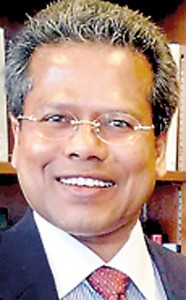Sunday Times 2
Prof. Mendis analyses Confucian links in Xi’s Belt-and-Road Initiative
View(s):Hong Kong – October 17: Harvard Sino-American policy expert Dr. Patrick Mendis recently addressed the inaugural Belt & Road Lecture at the Faculty of Education in the Hong Kong University (HKU), which has been ranked fourth in the world.

Prof. Mendis
The public lecture entitled “American Vision and Chinese Mission: Will President Xi’s Belt and Road Initiative (BRI) Create a ‘Pacific’ New World Order?”
Prof. Mendis explored the less-known Confucian influence on the enduring American foundation for a deeper understanding of the evolving Sino-American relationship and its challenges for Hong Kong and the world.
Sri Lanka is an integral part of China’s One Belt, One Road (OBOR) Strategy—commonly known as the BRI.
The “Island of Pearl” in the Indian Ocean now connects the “Pearl Square” in the Middle East and the “Pearl Delta” of triangulated region of Macau, Shenzhen, and Hong Kong through President Xi Jinping’s 21st Century Maritime Silk Road, said Professor Mendis.
In the age of President Donald Trump’s “Make America Great Again” nationalistic policies, the Harvard sinologist reminded the founding vision of the United States as a global nation. He then explained how President Xi is using a similar but commercial vision in the “Chinese mission” in the world.
The scholar compared the two countries and said, “the Chinese culture and Confucian philosophy inspired the Founding Fathers of the United States of America.”
Quoting Benjamin Franklin, a founding father, Professor Mendis said, “the Chinese are regarded as an ancient and highly civilized nation.” On the Chinese sage, Franklin also wrote about the relevance of Chinese civilisation in American progress, saying, “What Confucius proposed to the princes” for moral governance “according to this [Confucian] model” for a “happy and flourishing empire” in the United States.
He elaborated that Thomas Jefferson, another founding father and the third president, envisioned that the new republic would keep “honest friendship with all nations and entangling alliances with none.”
Over the years, this founding vision has gradually changed, the professor explained. With the BRI, China intends to rejuvenate its Confucian culture and the commercial glory of ancient Silk Road civilization.
Professor Mendis, Harvard Kennedy School’s former Rajawali senior fellow at the Ash Center for Democratic Governance and Innovation, is an associate-in-research of the Fairbank Center for Chinese Studies at Harvard University.

